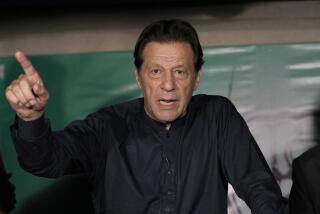Pakistan’s Ex-Premier Falls as He Rose--at Military’s Bidding
- Share via
ISLAMABAD, Pakistan — More than two decades after he was ushered into Pakistani politics by a military ruler, the military has proved to be Nawaz Sharif’s downfall.
The former prime minister, ousted by the army in October, was sentenced Thursday to life in prison, convicted on charges filed under the new military regime.
Sharif began his political career as finance minister in the Punjab provincial cabinet. He became chief minister in the late 1980s.
In 1990, he was elected prime minister of Pakistan, but his term ended abruptly three years later. Accused of massive corruption and economic mismanagement, he was removed by the president, who used his constitutional authority to dismiss the government.
But Sharif returned to power in 1997 with a landslide two-thirds majority and turned his attention toward consolidating control.
He removed the president’s constitutional authority to dismiss civilian governments and relegated the presidency to a figurehead post.
Within two years, Sharif had engaged in confrontations with every institution in the country. He forced the chief justice of the Supreme Court to resign after an open display of hostility toward the court, prompted the president to quit and forced the previous army chief to leave his post.
The ousted army chief was replaced by Gen. Pervez Musharraf, a former commando. Relations between Sharif and Musharraf began to deteriorate after last summer’s bitter border war with neighbor India in Kashmir, the Himalayan territory claimed by both countries.
Sharif was charged with hijacking after refusing to allow the plane returning Musharraf to Pakistan to land in the southern city of Karachi. The standoff occurred in the midst of an Oct. 12 coup that brought Musharraf to power. The army seized control after Sharif replaced Musharraf with a junior general.
On Thursday, the court that convicted Sharif also ordered all of his property confiscated. That could mean an extensive hand-over: His family’s holdings were worth $112 million in 1990, and it now owns more than a dozen steel foundries, sugar mills and textile mills in Punjab as well as four apartments in Britain.
It was unclear, however, how much of the property would fall under the court order. Some of the holdings are believed to be registered to other family members.
More to Read
Sign up for Essential California
The most important California stories and recommendations in your inbox every morning.
You may occasionally receive promotional content from the Los Angeles Times.













